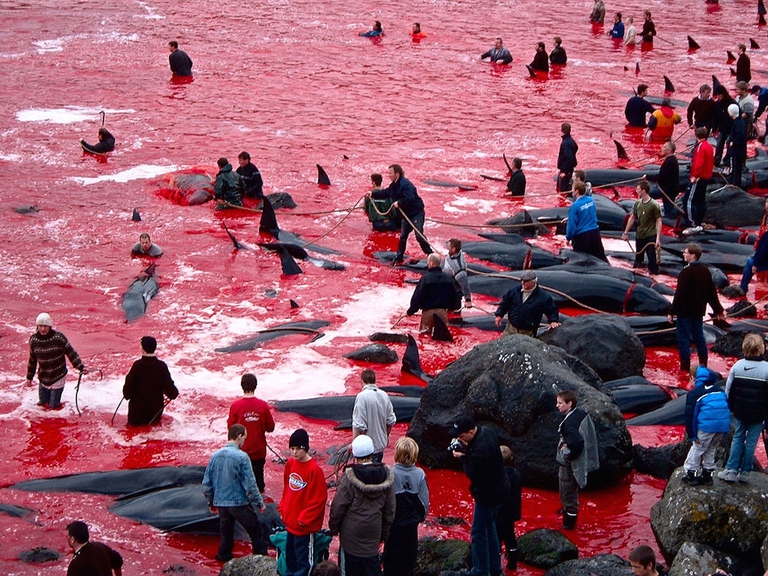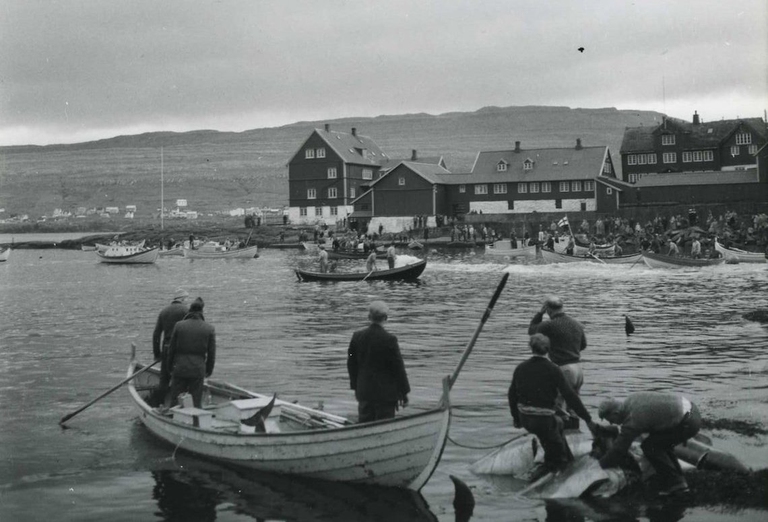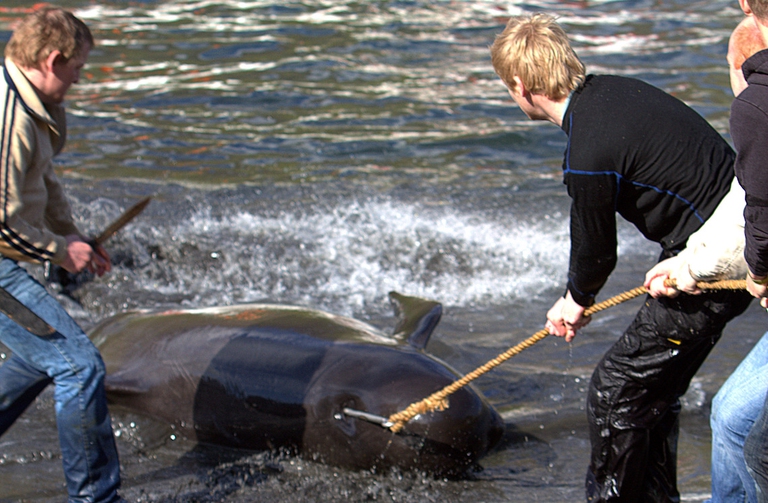
A group of experts in Tokyo suggested pouring radioactive water from Fukushima into the open sea. A marine biochemist explains the consequences of this absurd decision.
Grindadráp is the local name for a yearly event that sees the people of the Faroe Islands, a self-governing archipelago under Denmark, hunt long-finned pilot whales as well as other species of cetaceans such as bottlenose dolphins, white-sided dolphins and Risso’s dolphins. These species aren’t on the International Union for Conservation of Nature (IUCN)’s list of endangered animals, but
Grindadráp is the local name for a yearly event that sees the people of the Faroe Islands, a self-governing archipelago under Denmark, hunt long-finned pilot whales as well as other species of cetaceans such as bottlenose dolphins, white-sided dolphins and Risso’s dolphins. These species aren’t on the International Union for Conservation of Nature (IUCN)’s list of endangered animals, but the organisation suggests that there is a lack of data to prove that long-finned pilot whale populations in the North Atlantic aren’t depleting.
The Faroe Islands’ inhabitants have been fishing the local seas for centuries; the fist recorded grindadráp goes as far back as the 1584. Whaling is deeply embedded in their tradition and used to be essential to their survival, as the meat and blubber of the animals was used for sustenance.
Using fishing boats and dinghies the hunters work together to push the whales towards the beach, driving them into shallow waters where they eventually become stranded. The whales that aren’t immediately beached get pulled onto the shore using ropes. They’re then killed. Since the outlawing of spears and harpoons in 1985 on allegations of animal cruelty, some of the fishermen use knives while others use spinal lances, devices that sever the spinal chord cutting the blood flow to the brain.
These whaling sprees aren’t planned, though they usually take place in summer, and depend on specific conditions. The weather must be calm enough to permit the close navigation of boats, around 12 are needed, and enough people have to be available – all the participants have day jobs but when a grindadráp occurs anyone who’s free can and will participate. Finally, the whales must be close to shore and in the vicinity of one of 23 approved beaches. If even one of these conditions isn’t met then the whaling is called off, as in 2008.
One of the concerns is the sustainability of these hunts. The official website on whaling in the Faroe Islands reports that there are an estimated 778,000 pilot whales in the North Atlantic Ocean, 100,000 of which are found around the Faroe Islands. A 2013 report by Russell Fielding published in Society & Natural Resources: An International Journal says that for the past three centuries an average of 838 pilot whales and 75 dolphins have been hunted per year.
The Faroese argue that part of the reason why they only whale under certain conditions is to help replenish the populations of whales and dolphins that they’ve depended on for generations. On the other hand, although the catches have decreased over time (still, around 1,000 whales are killed a year), critics cite the consequences of whaling on a number of other cetacean species over the last two hundred years. Many are recovering from the brink of extinction only now that international mechanisms such as the International Whaling Commission‘s 1986 moratorium have outlawed certain whaling practices.
In fact, under the the Convention on the Conservation of European Wildlife and Natural Habitats (Berne Convention), the long-finned pilot whale is protected, which means it can’t be hunted in the European Union. Unsurprisingly the Faroe Islands have abstained from joining the Union.
Another issue is the contamination of the meat from water pollutants. For example, heavy metals such as mercury have been building up in the meat and blubber of the whales and dolphins. So much so that in 2008 Pal Weihe and Hogni Joensen, chief medical officers on the islands, declared the meat unfit for human consumption.
In addition, opponents of Grindadráp question the Faroese’s claim that the practice is for non-commercial purposes. Whale meat is sold in supermarkets and restaurants, and even marketed to tourists. Whilst these animals used to be an essential source of sustenance for the islanders, nowadays Faroese people’s diets have changed significantly, so the practice doesn’t impact their survival. Although there has been a decrease in consumption, many locals still feel deeply attached to this tradition and consider whale meat a delicacy.
On the one hand, the local communities of the Danish archipelago have hunted whales and dolphins for countless generations. On the other hand, hundreds, even thousands of these potentially endangered animals are slaughtered each year. It is yet to be seen whether international pressure will lead the Faroese to give up on this tradition, or whether the battle in the name of the long-finned pilot whale will continue claiming victims.
Siamo anche su WhatsApp. Segui il canale ufficiale LifeGate per restare aggiornata, aggiornato sulle ultime notizie e sulle nostre attività.
![]()
Quest'opera è distribuita con Licenza Creative Commons Attribuzione - Non commerciale - Non opere derivate 4.0 Internazionale.
A group of experts in Tokyo suggested pouring radioactive water from Fukushima into the open sea. A marine biochemist explains the consequences of this absurd decision.
The decline in grey and humpback whales in the Pacific and Atlantic Oceans has been traced to food shortages caused by rising ocean temperatures.
The United Nations has launched a major international alliance for ocean science, undertaking a mission close to all our hearts.
The cargo ship that ran aground off the coast of Mauritius on 25 July, causing incalculable damage, has split in two and its captain has been arrested.
The largest coral reef in the world is severely threatened by climate change, but researchers are developing strategies that could contribute to saving the Great Barrier Reef.
Seychelles have extended its marine protected area, which now covers over 400,000 square kilometres, an area larger than Germany.
Norwegian oil giant Equinor had pulled out of drilling for oil in the Great Australian Bight, one of the country’s most uncontaminated areas. A victory for activists and surfers who are now campaigning for the area to be protected forever.
30 per cent of the planet needs to be protected to stop precipitous species decline. The UN has set out its aims for the the COP15 on biodiversity scheduled for Kunming, China in October.
Ocean warming has risen to record highs over the last five years: just in 2019 the heat released into the world’s oceans was equivalent to that of 5-6 atomic bombs per second. The culprit, no doubt, is climate change.










